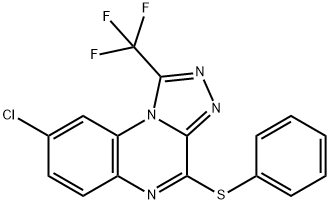Biological Activity
ec50: 0.631 μm by tnf-α by icam-1 elisa assayr-7050 is a tnf-α receptor signaling antagonist.tnf-α induces biological activity throgh stimulation of the tumor necrosis factor receptor. although plenty of pre-clinical and clinical evidence suggests a detrimental role, small molecule tnf-αsignaling pathway inhibitors remain largely unexplored in the context of a brain hemorrhage.
in vitro
r-7050 was identified as a selective inhibitot of tnf-α induced cellular signaling by using differential library screening. unlike biologic tnf inhibitors directly binding tnf-α, r-7050 could not affect binding of tnf-α to tnfr. in contrast, r-7050 was able to selectively inhibit the association of tnf receptor with intracellular adaptor molecules [1].
in vivo
in previous animal study, r-7050 was tested to attenuate neurovascular injury after intracerebral hemorrhage (ich) in mice. results showed that up to 2h post-injury administration of r-7050 was able to significantly reduce blood-brain barrier opening and attenuate edema development at 24h post-ich. in addition, neurological outcomes were also improved over the first 3 days after injury. whereas, r-7050 was not found to be albe to reduce hematoma volume, indicating the beneficial effects of tnfr inhibition were downstream of clot formation/resolution [2].
References
[1] gururaja tl, yung s, ding r, huang j, zhou x, mclaughlin j, daniel-issakani s, singh r, cooper rd, payan dg, masuda es, kinoshita t. a class of small molecules that inhibit tnfalpha-induced survival and death pathways via prevention of interactions between tnfalphari, tradd, and rip1. chem biol. 2007 oct;14(10):1105-18.
[2] king md, alleyne ch jr, dhandapani km. tnf-alpha receptor antagonist, r-7050, improves neurological outcomes following intracerebral hemorrhage in mice. neurosci lett. 2013 may 10;542:92-6.
